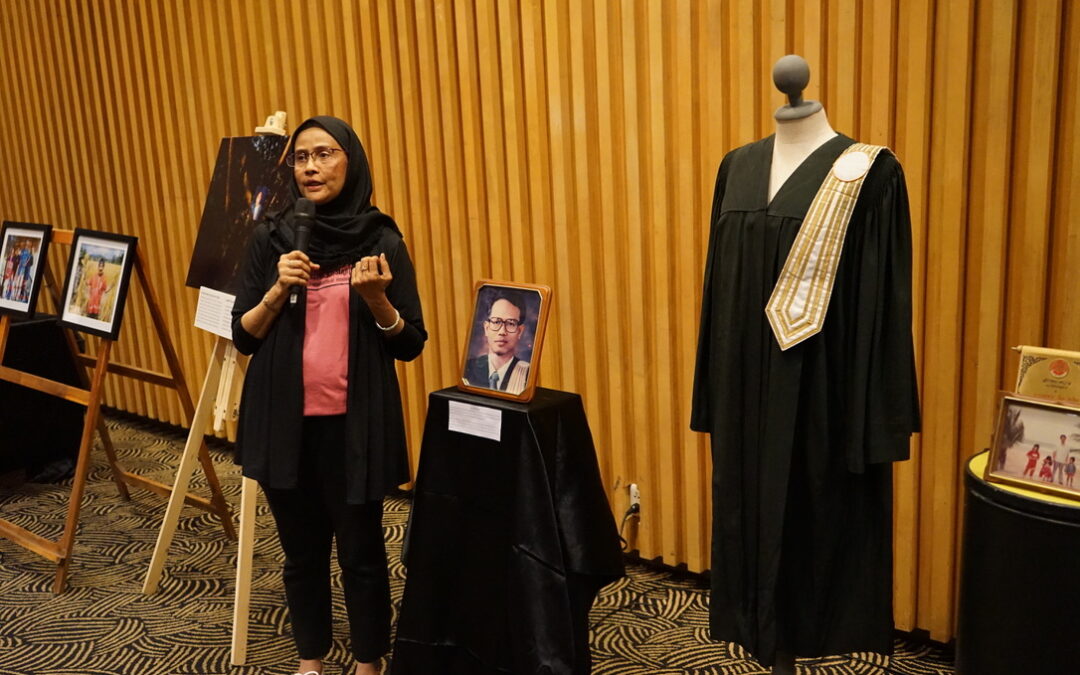
Mar 12, 2020 | News
On 11 March 2020, the ICJ co-hosted a panel discussion and an exhibition entitled “Committed to Memory: The Disappeared and Those They Left Behind.”
The event was held to mark the 16th anniversary of the enforced disappearance of a prominent lawyer and human rights defender Somchai Neelapaijit and other individuals who were subject to apparent enforced disappearance and whose fates remain unknown.
The event was held at Bangkok Art and Cultural Centre (BACC). More than 100 participants attended the event.
Opening remarks were delivered by Jenni Lundmark, Programme Officer, Delegation of the European Union to Thailand, and Associate Professor Dr. Gothom Arya, Adviser of the Institute of Human Rights and Peace Studies at Mahidol University.
Jenni Lundmark highlighted the European Union’s commitment to address torture and enforced disappearance and urged the Thai Parliament to pass pending anti-torture and enforced disappearance legislation without undue delay. Associate Professor Dr. Gothom called on the public to preserve the memory of the Thai persons who were victims enforced disappeared as well as many others whose disappearance were not recorded. He also encouraged the establishment of a network of victims of enforced disappearances to strengthen their advocates’ ability.
The event also featured photos and personal belongings of victims or potential victims of enforced disappearance, including: Somchai Neelapaijit, Thanong Po-Arn, Porlajee “Billy” Rakchongcharoen, Kamol Laosophaphan, Jahwa Jalo, Surachai Danwattananusorn, Siam Theerawut and Den Khamlae. For some of these cases, there has been a failure of authorities to conduct a prompt, effective, impartial and independent investigation into their cases. During the event, family members of the victims described stories from photos and personal belongings of the “disappeared” that were exhibited.
The panel discussion focused on progress of the investigations into enforced disappearances and evaluated the progress in developing legislation in Thailand to address this critical issue. The speakers included Angkhana Neelapaijit, wife of Somchai Neelapaijit; Thipwimon Sirinupong, lawyer who is representing Porlajee “Billy” Rakchongcharoen’s family; and Sanhawan Srisod, ICJ’s legal adviser.
During the discussion, speakers expressed concern at the recurrent delays in the amendment and enactment of the law against torture and enforced disappearance which will be critical for ensuring accountability and justice for victims of enforced disappearance. They also regretted that the latest Draft Act, after several rounds of revisions and public hearings, still had not addressed many of the principal shortcomings which the ICJ and other stakeholders and experts have indicated need necessarily be amended in order to bring the law into line with Thailand’s international human rights obligations.
The key concerns include the incomplete definitions of the crimes of enforced disappearance, the absence of provisions concerning the continuous nature of the crime of enforced disappearance and statute of limitations for torture and enforced disappearance crimes, and the inadequacy of provisions concerning safeguards against enforced disappearances.
Background
Somchai was stopped at a Bangkok roadside on 12 March 2004 and pulled from his car by a group of men. He has not been seen since.
At the time, Somchai was defending clients from Thailand’s restive southern provinces who were accused of attacking a military base as part of the ongoing insurgency in the region. Somchai had alleged police tortured the Muslim suspects.
Since 19 July 2005, DSI has spent more than 14 years and eight months investigating the enforced disappearance of Somchai Neelapaijit. However, there is little information in the public domain regarding its progress.
From 1980 to May 2019, the UN Working Group on Enforced or Involuntary Disappearances has recorded and transmitted 90 cases of alleged enforced disappearance to Thailand. Currently, 79 cases remain outstanding.
Further reading
Ten Years Without Truth: Somchai Neelapaijit and Enforced Disappearances in Thailand
Thailand: continuing delay in the enactment of the draft law on torture and enforced disappearance undermines access to justice and accountability
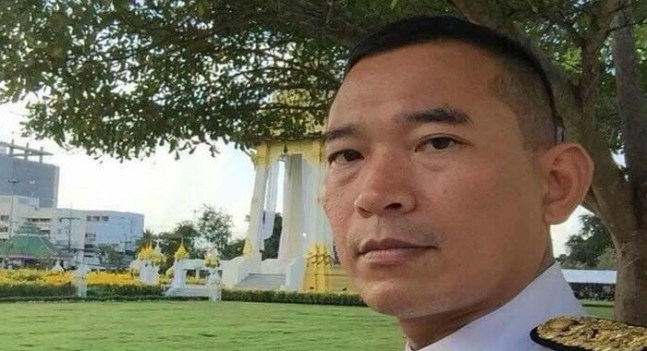
Mar 9, 2020 | News
The ICJ today expressed regret at the death of Judge Khanakorn Pianchana, who committed suicide on 7 March 2020. Judge Khanakorn was widely known after an attempted suicide in October 2019 following the delivery of a verdict which he claimed was interfered by a senior judge.
Judge Khanakorn previously served as Vice Presiding Judge of the Yala Provincial Court in Thailand’s restive southern region. He passed away on 7 March 2020 at his home in Chiang Mai province.
Background
Before the suicide, Judge Khanakorn posted a two-page letter on his Facebook page, in which he claimed that he had been subject to disciplinary proceeding and had criminal charge brought against him after he had publicized his concerns about interference by a superior judge into certain rulings. These involved five individuals detained and interrogated under special security laws in southern Thailand.
In October 2019, Judge Khanakorn claimed in a public letter that he had been ordered by a senior judge to rewrite a ruling in which he exonerated the five individuals charged with murder, for lack of evidence. Following his delivery of the verdict, he shot himself in the chest in a courtroom at Yala Provincial Court.
After his first suicide attempt, according to the Office of the Judiciary’s Press Release dated 18 November 2019, the Judicial Commission initiated an investigation against him for violations of provisions on discipline of judicial officials. He was subsequently transferred to the Court of Appeal Region 5 in Chiang Mai, at which time he was further investigated for committing criminal offences under the Firearms, Ammunition, Explosives, Fireworks and Imitation Firearms Act.
On 7 March 2020, according to the interview gave by Secretary-General of Office of the Judiciary, an initial investigation of the Judicial Commission found that there had been no improper interference, and the disciplinary actions and the criminal charges that are brought against Judge Khanakorn were based on his actions for carrying a gun into court and using the gun to attempt suicide.
Contact
Frederick Rawski, ICJ Asia-Pacific Director, t: +66 64 478 1121; e: frederick.rawski(a)icj.org
Download
To download the statement in Thai, click here.
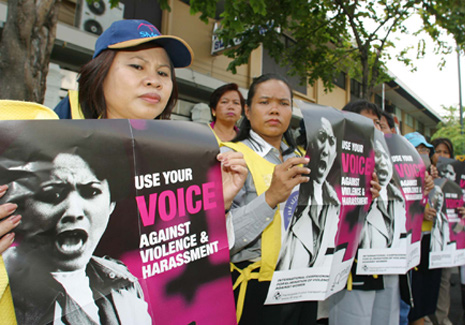
Mar 8, 2020 | News
The ICJ commemorates International Women’s Day by calling on States all over the world to take decisive steps to abolish or amend laws, policies and practices that discriminate against women and girls, including those belonging to Sexual Orientation, Gender Identity and Expression and Sex Characteristics (SOGIESC) minorities.
“All over the world, we are facing increasing attacks on the rule of law, which intensify existing inequalities resulting in compounded and intersecting forms of discrimination against women and girls, especially women from SOGIESC minorities,” said Emerlynne Gil, ICJ’s global focal point on gender.
The ICJ also calls on frontline justice actors, such as judges, lawyers and law enforcement officers, to take proactive steps in eliminating gender discriminatory practices in their work to further enhance access to justice for women.
Such action includes an open and inclusive discourse on regressive interpretations of religious and customary laws that discriminate against women.
The ICJ also urges States to acknowledge the diverse voices of women in this discourse, including those of women who belong to SOGIESC minorities.
“Women and girls, including those from SOGIESC minorities, are at a heightened risk of human rights abuses, most especially because a greater number among them is now living in poverty and is unable to access information about their rights, as well as justice for the violations they suffer,” added Emerlynne Gil.
.International Women’s Day is a symbolic acknowledgement of women’s struggle for gender equality in all spheres of life.
While celebrating the recognition of women’s legal rights and entitlements, the ICJ also notes with deep concern the growing trend around the world to push back on these advances in a manner that fundamentally violates the rights of women.
In 2019, the ICJ adopted the Tunis Declaration on Reinforcing the Rule of Law and Human Rights (Tunis Declaration), wherein it highlighted how “culture, tradition, or religion are being used to justify laws, policies, and practices that discriminate against women and girls”.
The proliferation of these discriminatory laws, policies and practices “come at a time when there is growing inequality, accelerating climate change, conflict, and large-scale displacement of people.”
Upholding cultural practices is often invoked as a convenient excuse to justify the continued existence of laws, policies, and practices that discriminate against women and girls, including those belonging to SOGIESC minorities.
While the ICJ affirms the importance of respecting cultural rights, these must be exercised in a manner consistent with core rule of law principles of non-discrimination, equality and equal protection of the law.
The ICJ notes that claims of cultural preservation are often based upon harmful gender stereotypes and deeply problematic patriarchal norms and attitudes that undergird the sanctification of discriminatory cultural, religious, traditional, and customary norms.
In the Tunis Declaration, the ICJ recognized “the persistent, deep entrenchment of patriarchal culture that perpetuates gender stereotypes in many national and international institutions, including those of the legal profession and judiciary.”
Harmful gender stereotypes, in turn, severely hamper women from enjoying their human rights and from equal access to justice, including for crimes of sexual and gender-based violence perpetrated against them.
Contact
Emerlynne Gil, ICJ Senior International Legal Adviser, email: emerlynne.gil(a)icj.org

Mar 4, 2020 | News
Today the ICJ called on the Malaysian authorities to cease investigations of human rights defenders engaging in peaceful protest.
The ICJ further said that the investigations pose a threat to the exercise of the right to expression and peaceful assembly, which is protected under international law and the Malaysian Federal Constitution.
“These investigations have the effect of harassing and intimidating human rights defenders and pro-democracy activists and look worryingly like a new crackdown on dissent,” said Frederick Rawski, ICJ Asia Pacific Director.
Malaysian law enforcement authorities have opened investigations against Dato’ Ambiga Sreenevasan, an ICJ Commissioner, and nineteen (19) other individuals including human rights defenders Fadiah Nadwa Fikri, Dobby Chew, Amir Abd. Hadi and Nalini Elumalai. They are being investigated for violations of the deeply problematic Sedition Act 1948 and the Peaceful Assembly Act 2012, in connection with wholly peaceful gatherings held over the past few days that were called attention to the recent, sudden political changes in Malaysia.
The ICJ raised concerns that the laws pursuant to which the investigations are being conducted are inconsistent with international and constitutional human rights law and standards. The Peaceful Assembly Act 2012 imposes onerous requirements to organize a peaceful assembly. Meanwhile, the Sedition Act 1948 contains wide, overbroad definitions of what amounts to a ‘seditious tendency’, placing critical voices at risk.
“International law protects the right to hold peaceful assemblies, with limited exceptions not applicable here,” said Emerlynne Gil, ICJ Senior International Legal Adviser. “The ICJ has repeatedly called on Malaysia to abolish these laws, which impose unjustifiably burdensome restrictions and disproportionate penalties on the exercise of freedom of expression and assembly.”
The UN Special Rapporteur on the rights to freedom of peaceful assembly and of association and other international legal authorities has also said that while some regulation can be appropriate concerning places of protest, “no authorization should be required to assemble peacefully.”
Previous governments have promised to abolish the Sedition Act, including the Pakatan Harapan coalition which pledged to scrap both the Sedition Act and reform the Peaceful Assembly Act as part of their election manifesto in 2018. To date, no such reforms has been undertaken.
The ICJ reiterated its call on the government to abolish the Sedition Act and abolish or reform the Peaceful Assembly Act 2012. The ICJ also called on the Malaysian government to end the use of these laws to harass and investigate persons solely for participation in peaceful protest.
Contact
Emerlynne Gil, Senior International Legal Adviser, International Commission of Jurists, t: +66 2 619 8477 local 203; e: emerlynne.gil(a)icj.org
Background
Malaysian human rights defenders and civil society groups have been organizing peaceful assemblies to express concern over the current political developments. On 2 March 2020, Malaysian police opened investigations into several individuals for alleged violation of the Sedition Act.
Section 4(1) of the Act reads “[a]ny person who… does or attempts to do, or makes any preparation to do, or conspires with any person to do, any act which has or which would, if done, have seditious tendency… shall be guilty of an offence and shall, on conviction, be liable for a first offence to a fine not exceeding five thousand ringgits or to imprisonment for a term not exceeding three years or to both.”
The Peaceful Assembly Act 2012 sets down onerous requirements that must be met in order to carry out a peaceful assembly, including: restrictions on the right to organize or participate in an assembly (Section 4) which includes non-citizens; requirements for a ten day notice of an assembly to the Officer in Charge of the Police District, failure to do so will be punished by a fine not exceeding ten thousand ringgit (Section 9(5)); and broad restrictions and conditions that may be imposed by the Officer in Charge of the Police District at their discretion (Section 15).
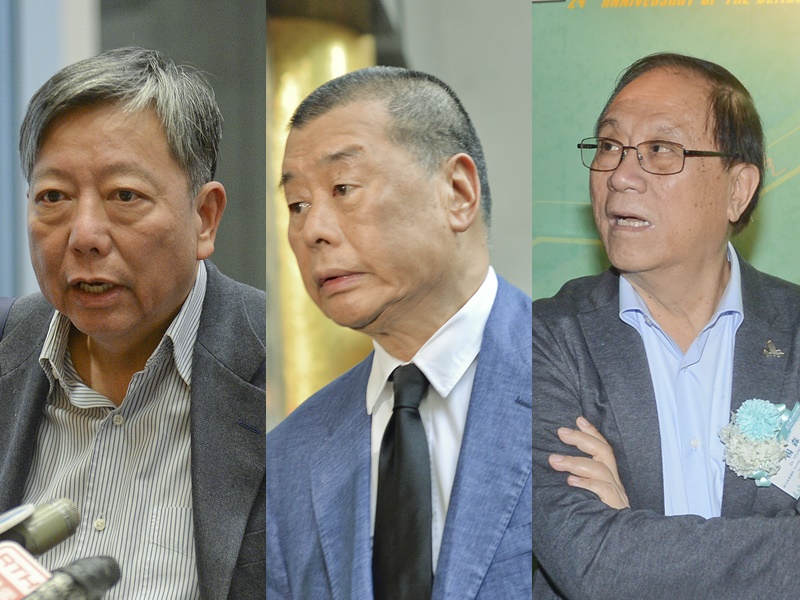
Mar 4, 2020 | News
Following the arrest on 28 February of at least three persons, the ICJ has called on the Hong Kong authorities to drop criminal charges of taking part in an “unauthorized assembly” against them and to reform the Public Order Ordinance in compliance with international human rights obligations.
On 28 February, Hong Kong police arrested publisher Jimmy Lai, the founder of Next Media, which publishes the Apple Daily newspaper, and two pro-democracy activists, Lee Cheuk-yan, the vice-chairman of the Labour Party, and Yeung Sum, a former chairman of the Democracy Party, for taking part in a march banned by police on 31 August 2019. The Police prohibited the march on the stated grounds that the Civil Human Rights Front could not guarantee the march would be peaceful and orderly, shifting responsibility of maintaining order to the organizer.
“We are extremely concerned about the way in which the unauthorized assembly provisions of the Public Order Ordinance has been used to silence lawful expressions of political opinion since the Umbrella Movement of 2014,” said Frederick Rawski, ICJ’s Asia Pacific Director. “These most recent arrests, made for allegedly participating in a largely peaceful protest more than six months ago, are part of a troubling pattern of bringing legal action to harass activists involved in peaceful acts of protest.”
The arrests were made pursuant to the Hong Kong SAR Public Order Ordinance (Cap. 245) Section 17A(3)(a). Under the ‘unauthorized assembly’ provisions of the law, every person who, without lawful authority or reasonable excuse, knowingly takes or continues to take part in or forms or continues to form part of any such unauthorized assembly is guilty of an offence and can be sentenced up to five years imprisonment.
The authorities have wide discretion to prohibit public meetings, and prosecute those who are alleged take part in them. These overbroad provisions have been used to restrict the proper exercise of free assembly and association rights – including onerous requirements to obtain a “notice of no objection” from the government for even small gathering under a threat of a maximum five years imprisonment for violations.
“The ICJ calls upon the Hong Kong SAR government to take measures to protect the right to peaceful assembly and create an environment in which people can safely express diverse ideas and dissenting voices – consistent with international legal obligations,” said Rawski. “This includes ensuring that the law is not used to harass pro-democracy activists and human rights defenders.”
The ICJ underscores that any restrictions to the right of peaceful assembly must be narrowly drawn to be permissible under international law. Restrictions are not permissible unless they have been provided by law, and are necessary and proportionate to a legitimate purpose enumerated in article 21 of the ICCPR, such as public order. However, imposing criminal charge on people exercising their right of peaceful assembly who fail to comply with a procedural requirement, such as notification, unduly restricts freedom of peaceful assembly by adding unnecessary barriers to public gatherings. Furthermore, the sentencing guidelines of the Ordinance, which include the possibility of a peaceful participant of a public assembly being sentenced to five years in prison if the organizers fail to comply with the notification requirement, are extreme, disproportionate and open to abuse.
Hong Kong SAR, though not the rest of the PRC, is legally bound by the ICCPR. Article 21 of the ICCPR and Article 27 of the Basic Law in Hong Kong both recognize and protect the right of peaceful assembly. The UN Human Rights Committee, the supervisory body responsible for the ICCPR and other UN independent authorities, have repeatedly urged the authorities to ensure that the Public Order Ordinance is implemented in conformity with Hong Kong’s obligations under the ICCPR.
To download the full statement with additional information, click here.
See also: Hong Kong: ensure police do not use excessive force against protesters
https://www.icj.org/hong-kong-ensure-police-do-not-use-excessive-force-against-protesters/
Contact:
Frederick Rawski, ICJ’s Asia Pacific Regional Director, t: +66 2 619 84 77; e: frederick.rawski(a)icj.org
Boram Jang, ICJ Legal Adviser, Asia & the Pacific Programme, e: boram.jang(a)icj.org
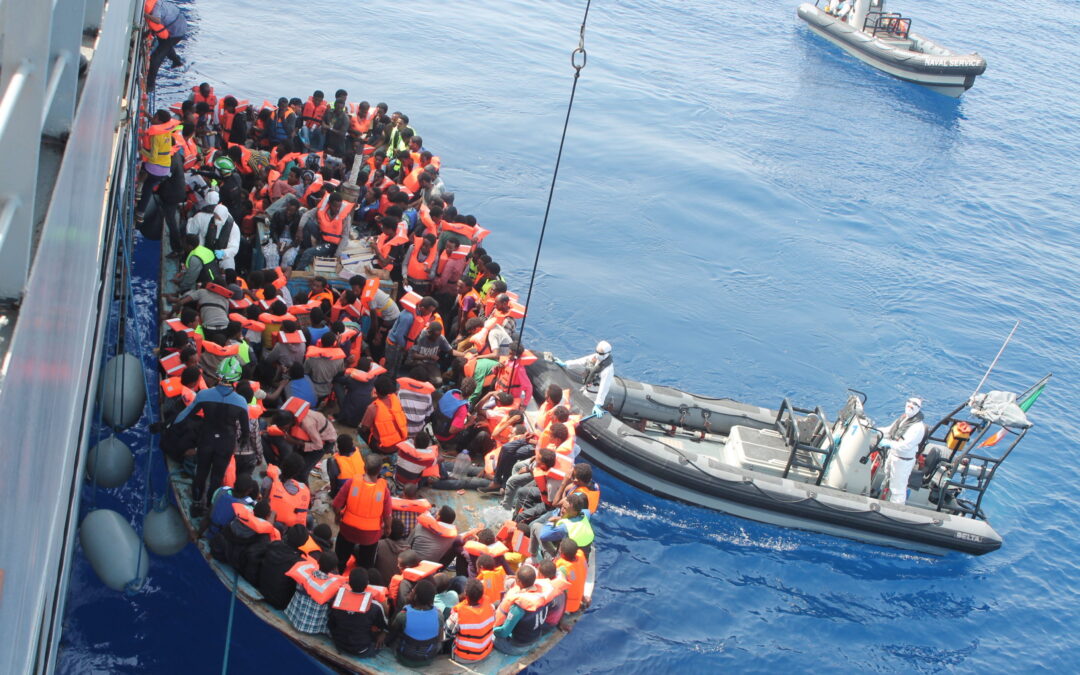
Mar 3, 2020 | News
The ICJ today called on the Greek authorities to withdraw their decision to close its border with Turkey for “national security” reasons as it constitutes a clear breach of the country’s obligations under international refugee and human rights law as well as EU law.
Prime Minister Kyriakos Mitsotakis has ordered the closure of the border with Turkey for “national security” reasons as thousands of refugees have been arriving at the border with Greece.
The ICJ said that the decision to close the border to migrants and refugees coming from Turkey breaches their right to seek asylum, the principle of non-refoulement and the prohibition of collective expulsion, which Greece must uphold under international human rights and refugee law and the EU Charter.
“Any violence and push-backs occurring at the border and at sea must stop and the persons responsible for acts of violence must be duly investigated and prosecuted. Respect for human rights principles that form part of the EU’s founding values require that refugees are not pushed back at the borded,” said Massimo Frigo, Senior Legal Adviser for the ICJ Europe and Central Asia Programme.
“Assistance should be centred on fostering access to asylum and not on strengthening border control where, in the current situation, EU authorities, such as Frontex, risk assisting in human rights violations,” he added.
The ICJ calls on the European Union to immediately set up a relocation plan with the Greek authorities to allow them to properly process asylum applications without placing refugees in dire reception conditions, such as those existing for refugees on the Greek islands.
The ICJ, together with ECRE and the Greek Refugee Council has launched a complaint against Greece before the European Committee of Social Rights on the degrading conditions of migrant children in Greece (ICJ and ECRE v. Greece).
Background
The movement of refugees comes after the declaration by President Recep Tayip Erdogan not to continue to retain on its territory Syrian refugees under the so-called “EU-Turkey statement”, following the armed conflict in Idlib (Syria).
Under this “statement”, Turkey had previously agreed to retain Syrian refugees on its territory and to accept Syrian refugees that reached Greek territory without their request of international protection being examined by the Greek authorities.
On the basis of the same “statement”, the EU had agreed to resettle some of the Syrian refugees in its Member States.
Contact
Massimo Frigo, Senior Legal Adviser, ICJ’s Europe and Central Asia Programme, t: +41 22 979 3805; e: massimo.frigo(a)icj.org










